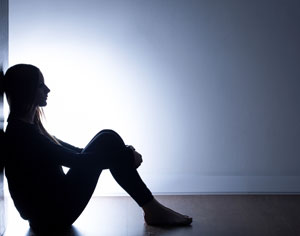Progesterone Therapy and Depression – Understanding the Mood Changes
Menopause – a time that brings depression, mood swings, hot flashes, weight gain, memory loss, night sweats, sleeplessness, memory loss, declining bone density, vaginal dryness, loss of libido, and depression to a woman’s life. If you caught the fact that memory loss and depression were mentioned twice, you are right. Just think about how often you find yourself repeating things or asking others to repeat what they just said. If all of this is not enough to make you feel depressed, what is? That is why both of those symptoms that can be associated with declining progesterone levels were mentioned twice in that sentence.
This report will focus on progesterone therapy and depression, and how one can help alleviate the other.
Hormonal changes and imbalances can hit at any stage of life. Puberty is a time when these chemicals often fluctuate intensely, leading to wild mood swings in some children. Menstruation onset can have an adverse effect on some girls. It is essential to alert the doctor to any significant changes at this time. For women of childbearing years, every month may seem like an emotional rollercoaster. If you find that you are falling into this category, it may be necessary to get your blood levels checked for progesterone, estrogen, testosterone, and growth hormone to ensure that everything is as it should be. One hormone out of balance can have widespread effects on the body, mind, and mood.
The use of progesterone treatment for depression in women who have been diagnosed with low progesterone/high estrogen levels is crucial. Physiologically, this hormonal imbalance can lead to weight gain, bone loss, and many other problems which can further add to a depressed state of mind.
Progesterone Decline and Mood Changes
As many as 1 in 3 women taking birth control pills may suffer from depression. The hormones contained in these pills are often synthetic, and may affect some women in adverse ways. Just because one brand works for one person does not make it the best choice for others. It is essential to communicate with the doctor if birth control side effects are causing concern.
Progesterone serves many vital functions in the body, including:
- Helping to protect the bones
- Regulating sex drive
- Enhancing brain functions
- Reducing the risk of heart disease
- Promoting positive mood
- Increasing energy
- Maintaining muscle tone
- Preparing the endometrium for pregnancy
- Protecting prostate functions
- Preventing fat storage
- Normalizing blood clotting properties
- Reducing the risk of uterine fibroids
- Offering protection from breast, endometrial, and ovarian cancer
- Is a source hormone for testosterone production
- Inhibits the production of 5-alpha reductase, an enzyme that converts testosterone into DHT (dihydrotestosterone)
- Has anti-inflammatory properties
With all of these vital functions, it is easy to see how progesterone and depression, anxiety, and mood changes can go together when the body is not producing an adequate supply of this hormone.
Another significant area of progesterone therapy and depression is when women who have just given birth go through postpartum mood changes. Postnatal depression is different from other mood swings or changes, and must be taken seriously at all times. Getting the right treatment is essential for a positive outcome.
When using progesterone therapy, postpartum depression can be successfully treated to restore a positive mood and state of mind.
Benefits of Progesterone Therapy for Depression
As a woman approaches menopause, her ovaries begin to decrease the amount of hormones they produce. It is at this time when both progesterone and testosterone begin to decline that loss of sex drive, vaginal dryness, mood changes, foggy-headedness, and weight gain start to have a critical effect on daily performance and functions. Poor concentration, sleep disturbances, and memory loss are typical symptoms at this time, and when reported to general doctors, these may appear as signs of clinical depression or even aging. These concerns should never be brushed aside in this way.
There are many positive benefits associated with receiving progesterone therapy for depression if a doctor has run the required blood tests that can show that hormonal decline is present. One of the biggest concerns about low progesterone levels is that its role as a source hormone can alter testosterone levels in the body, as well, leading to a host of other concerns.
Another positive about progesterone treatment & depression is the fact that progesterone has a calming effect on the brain. Perimenopausal women can receive effective results in the area of anxiety and depression with progesterone treatment administered topically with a bioidentical cream.
It is essential to remember that there is a tremendous difference between progesterone and progestin – the synthetic form of this hormone that is found in most birth control pills. Progestin does not have the same molecular structure as progesterone, and can result in undesirable side effects.
To learn more about progesterone therapy and depression, or to inquire about any type of hormone replacement therapy, please contact National HRT for a free consultation.
- Hormone replacement therapy and antidepressant prescription patterns: a reciprocal relationship Roger S. McIntyre, Jakub Z. Konarski, Sophie Grigoriadis, Nancy C. Fan, Deborah A. Mancini, Kari A. Fulton, Donna E. Stewart, and Sidney H. Kennedy Dialogues Clin Neurosci. 2002 Jun; 4(2): 211–223.
- Reproductive hormonal treatments for mood disorders in womenPeter J. Schmidt, MD David R. Rubinow, MD
- Cochrane
- MedlinePlus
- Progesterone for treatment of symptomatic menopausal women J. C. Prior Pages 358-365 | Received 15 Jan 2018, Accepted 25 Apr 2018, Published online: 02 Jul 2018
- onlinelibrary.wiley.com
- Efficacy of Transdermal Estradiol and Micronized Progesterone in the Prevention of Depressive Symptoms in the Menopause Transition Randomized Clinical Trial Jennifer L. Gordon, Ph.D.; David R. Rubinow, MD; Tory A. Eisenlohr-Moul, PhD2; et al Kai Xia, PhD2; Peter J. Schmidt, MD; Susan S. Girdler, Ph.D. JAMA Psychiatry. 2018;75(2):149-157.
- Wikipedia




